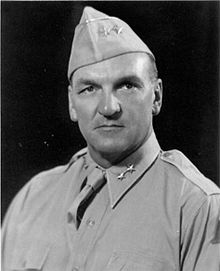John Shirley Wood
| John Shirley Wood | |
|---|---|

Major General John S. Wood, U.S. Army
|
|
| Nickname(s) | "P" "Tiger Jack" |
| Born |
January 11, 1888 Monticello, Arkansas |
| Died | July 2, 1966 (aged 78) Reno, Nevada |
| Place of burial | West Point Cemetery |
| Allegiance |
|
| Service/branch |
|
| Years of service | 1912-1946 |
| Rank |
Major General |
| Commands held | 2nd Battalion, 16th Field Artillery Regiment 3rd Battalion, 80th Field Artillery Regiment 1st Infantry Division Artillery 2nd Armored Division Artillery Combat Command A, 5th Armored Division 4th Armored Division Tank Training Center, Fort Knox, Kentucky |
| Battles/wars |
World War I World War II |
| Awards |
Distinguished Service Cross Army Distinguished Service Medal Silver Star Air Medal (2) Bronze Star (2) |
John Shirley Wood (January 11, 1888 – July 2, 1966) was a United States Army major general. He was a career officer who served in World War I, and is most notable for training and commanding the 4th Armored Division which spearheaded General Patton's Third Army drive across France in World War II.
John S. Wood was born in Monticello, Arkansas on January 11, 1888, and was the son of Arkansas Supreme Court Justice Carroll D. Wood and Reola (Thompson) Wood. John Wood graduated from the University of Arkansas in three years, in 1907, was a member of the Kappa Alpha Order and was quarterback and captain of the football team. In 1908, he began attendance at the United States Military Academy; he graduated in 1912, and lettered in football, wrestling and boxing.
Wood had taught chemistry while at the University of Arkansas, and at West Point he received his first nickname, "P" for "professor" because he used his skills as an instructor to tutor many academically deficient classmates.
Wood was commissioned a second lieutenant in the Coast Artillery on June 12, 1912. He made an early mark in military academics, including assistant football coach and Chemistry instructor at West Point. Wood wrote on military topics, and his articles and reviews and digests of military literature from other countries, including France, Germany, Italy and Spain appeared in professional journals throughout his career. In August 1916, he returned to the United States Military Academy faculty. He was promoted to captain on May 15, 1917 and major on December 18.
...
Wikipedia
